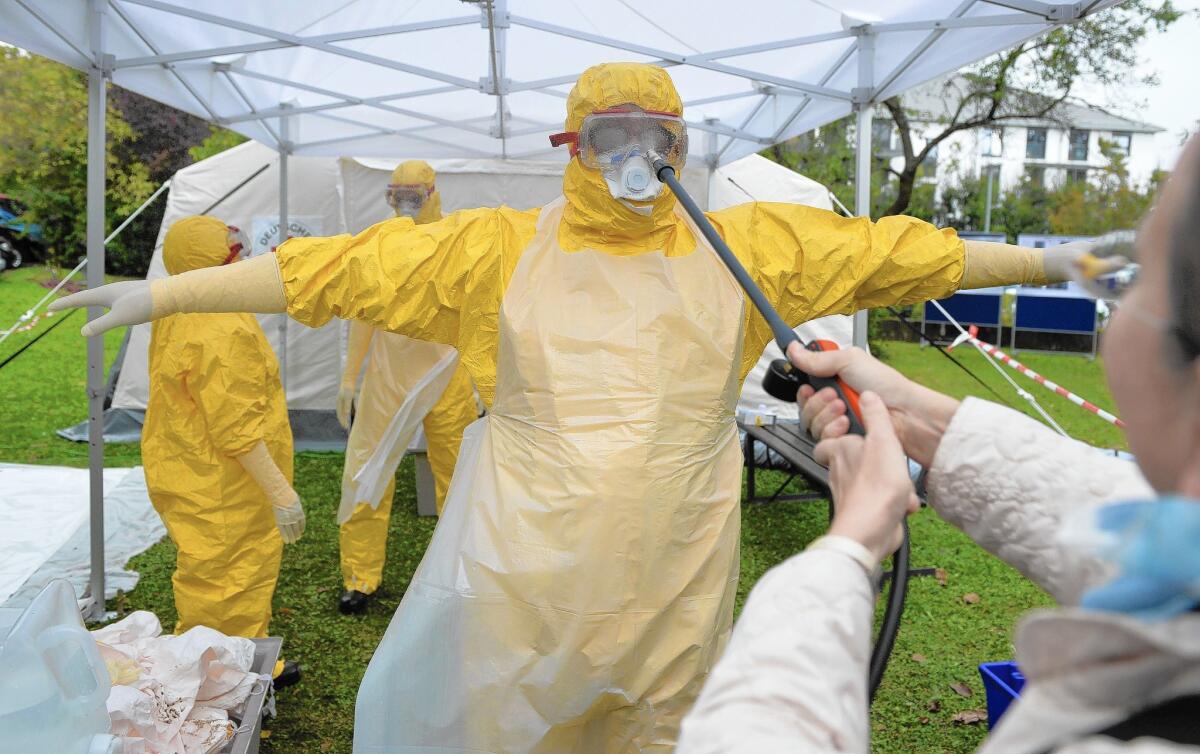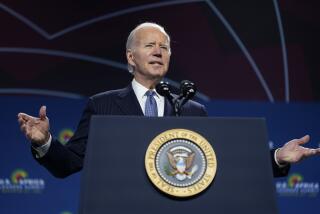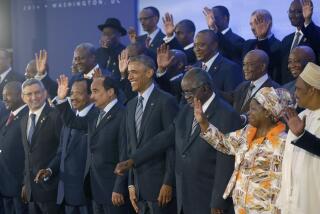Obama pulled 2 ways in responding to Ebola

- Share via
Reporting from Washington — President Obama talked up his administration’s response to Ebola and the procedures standing as a line of defense against the spread of the virus in the U.S. while flanked by military and civilian advisors.
After several minutes of this show of force, he ended with an unscripted message: the desperate circumstances and need for help fighting Ebola in West Africa.
“Let’s keep in mind that, as we speak, there are children on the streets dying of this disease — thousands of them,” Obama told reporters Monday. “Obviously my first job is to make sure that we’re taking care of the American people, but we have a larger role than that.”
The moment revealed a tension in the president’s response to the deadly disease that’s devastating parts of West Africa and causing fear in the United State.
While Obama and his team have embarked on a public campaign to reassure Americans that Ebola will be contained and conquered by the U.S. health system, the president has also tried to turn attention to the core of the outbreak 5,000 miles away.
The dual goals conflict at times. The diagnosis of a Liberian man in Dallas last week turned Ebola from a simmering yet distant problem to a much nearer concern. White House spokesman Josh Earnest reiterated Tuesday that additional screening protocols are being developed for travelers.
The White House appears to have found itself taken aback by the man’s arrival in the U.S. and subsequent diagnosis. Last month, the president went to the national Centers for Disease Control and Prevention in Atlanta and declared that the necessary safeguards were in place to “so that someone with the virus doesn’t get on a plane for the United States.” He downplayed the possibility of Ebola crossing the ocean as “unlikely.”
But officials are engaged in a full-scale campaign of managing the message at home and “injecting reality” into the conversation, said one administration official who would not be named relaying internal discussions.
How they do so is being closely watched by health advocates and experts.
When Obama announced that he was sending military personnel to West Africa, Laurie Garrett, an expert on infectious diseases and global health at the Council on Foreign Relations, noted that she was pleased to hear a shift in rationale. Until then, officials had too often based the case for U.S. involvement on the potential that the disease could mutate and endanger Americans, rather than the “catastrophic” threat the disease posed to the economy or the people in the region, she said at the time.
That criticism was particularly pointed in its aim at the nation’s first African American president, whose administration has often been criticized for giving Africa short shrift and compared unfavorably to the George W. Bush administration on directing U.S. attention and money to fighting disease there.
Obama’s Africa policy is now “almost synonymous with Ebola-response policy,” said J. Peter Pham, director of the Africa Center at the Atlantic Council. The disease diminishes the administration’s capacity to focus on other initiatives on the continent, he said. “All that goes to the back burner.”
As Obama has had to increase his focus on the epidemic, Garrett and others noted he has tried to emphasize the importance of stabilizing West Africa.
Obama has often described the Ebola outbreak that is believed to have killed more than 3,400 people — primarily in Liberia, Sierra Leone and Guinea — as a “national security priority.” The World Health Organization figures include suspected and confirmed cases, although officials say the real number could be much higher. Obama emphasized the potential economic repercussions and threat of violence and extreme poverty brought on by the disease.
Others noted Obama’s desire to help West Africa in the White House’s rejection of calls to impose a ban on travelers from there. Some argue such a ban is the best way to ensure the disease does not spread in the U.S., but officials and some experts say it would cut off shipments of aid and keep out badly needed healthcare workers, not to mention the symbolic message it would send.
“It would look like we’re sealing them off like a death ship infected with cholera and letting them float around the ocean and ... die alone,” said David Quammen, an author whose new book, “Ebola: The Natural and Human History of a Deadly Virus,” is due out this month.
“The truth is,” he said, “nobody in America is going to be safe until this outbreak is ended in West Africa. There are always going to be people coming on planes.”
The administration official said that the message a travel ban might send is not “foremost” on the list of concerns and that the White House doesn’t see a concerted effort to balance Obama’s domestic message with reminders of the trouble abroad. The administration is trying to spread the facts in a difficult environment, the official said.
“Obviously Ebola has a very scary sound to it and we understand that. But frankly, the public and media hysteria has overblown the danger Americans actually face from this,” the official said. “It’s not a matter of trying to calm fears. It’s really injecting truth and sanity and a dose of reality.”
In Spain, three people were in quarantine Tuesday for possible exposure to Ebola after a nursing assistant at a Madrid hospital contracted the virus. The case has raised questions about the quality of the protective equipment and training received by medical personnel caring for Ebola patients in the country. The nursing assistant was part of the medical team at Carlos III Hospital that cared for two Spanish priests who were infected in West Africa. Both died.
kathleen.hennessey@latimes.com
Times staff writer Alexandra Zavis in Los Angeles contributed to this report.
More to Read
Sign up for Essential California
The most important California stories and recommendations in your inbox every morning.
You may occasionally receive promotional content from the Los Angeles Times.











